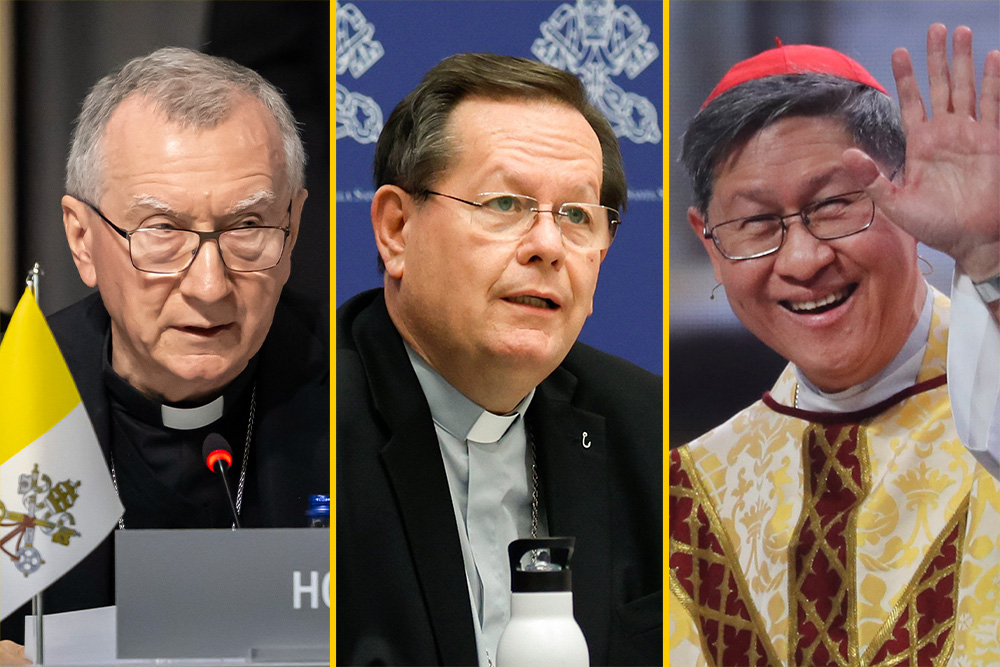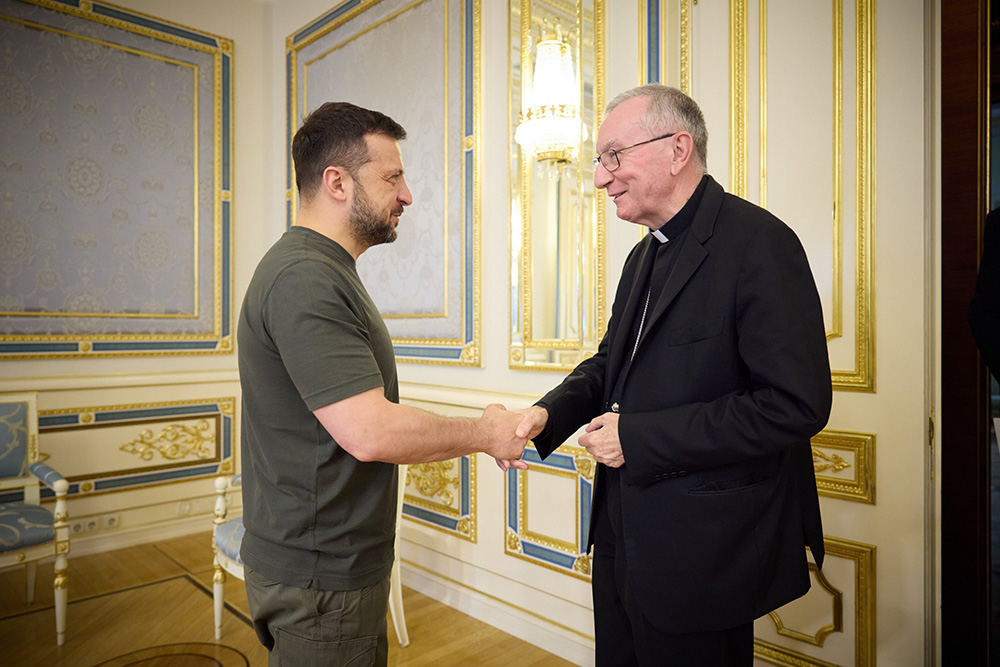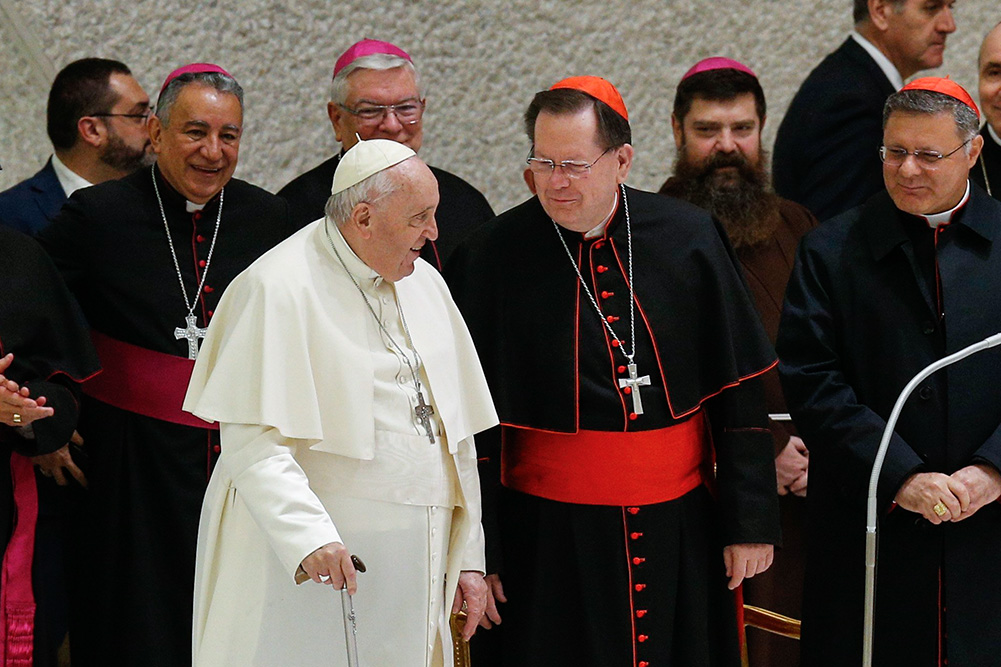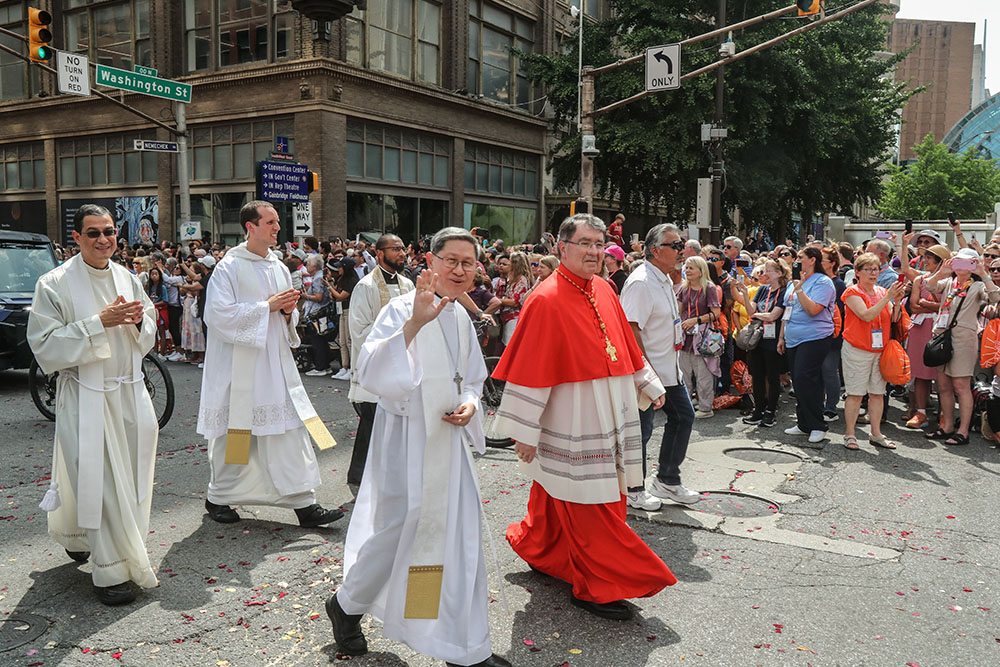
From left: Cardinal Pietro Parolin (CNS/KEYSTONE/EDA/POOL/Alessandro della Valle); Canadian Cardinal Gérald Lacroix (CNS/Lola Gomez); Cardinal Luis Antonio Tagle (OSV News/Bob Roller)
Since the beginning of his pontificate, Pope Francis has refused to take a proper summer vacation — forgoing the tradition of popes escaping the Roman heat at the holiday villa of Castel Gandolfo outside of the city.
Even so, during July and August, the pope is taking a break from most liturgies and meetings leading to a reduced public schedule, and this week — as Francis gets some much needed rest inside Vatican walls ahead of the longest international trip of his papacy in September — three potential future popes are having their own moment in the spotlight.
While cardinals are forbidden from waging a campaign for the papacy, major public events or news surrounding them can't help but to raise their profiles both among fellow church leaders and ordinary Catholics alike. While eventual ballots will be cast in the Sistine Chapel in secret, the public scrutiny of possible candidates began long ago.
On July 19, Francis' secretary of state, Italian Cardinal Pietro Parolin, arrived in Ukraine for a weeklong visit as the pope's legate for the concluding celebration of the pilgrimage of Ukrainian Latin Rite Catholics to the country's Marian Shrine of Berdychiv.
Advertisement
While it's billed as a pastoral visit, the trip will inevitably have political consequences. The trip is the first visit of the Vatican's top diplomat to the country since Russia's invasion in February 2022 and it comes at a delicate time. A potential second Donald Trump presidency and Europe under the heightened influence of Viktor Orbán — both of whom are sympathetic to Russia — have fueled fears of eroding Western support for the beleaguered nation.
For more than two years now, Ukrainian leaders have pleaded for Francis to visit the war-torn nation. Francis, however, has insisted that he will not go until he can also visit Moscow in an effort to influence a peace deal.
At 69 years old, Parolin has a reputation as a cautious, if at times indecisive, diplomat who has sent mixed signals about a post-Francis era in church life. Some conservative-leaning cardinals now see him as the most reliable candidate to stem the tide of Francis' reforms and, regardless of ideological persuasions, he's widely considered the candidate to beat, due to name recognition alone, in what is expected to be an unpredictable next conclave.
There's little doubt that as Parolin travels throughout Ukraine this week and consoles mothers who have lost children in the war, meets with President Volodymyr Zelenskyy and other high-level governmental officials, and greets young children, that there are church leaders there and elsewhere considering the fact that while a papal visit may remain off the table, a future pope may be in their midst.

Cardinal Pietro Parolin, Vatican secretary of state, meets Volodymyr Zelenskyy, president of Ukraine, during his visit to Ukraine July 23. (CNS/Volodymyr Zelenskyy via X)
Meanwhile, in Canada, Cardinal Gérald Cyprien Lacroix of Quebec City announced that he would be resuming his duties after an investigation cleared him of sexual misconduct allegations that surfaced earlier this year.
The 66-year-old archbishop has been on the ascendancy during Francis' papacy, playing host to the pope when he visited Canada in 2022 and, a year later, being named to the pope's council of cardinal advisers (or the "C-9" as it's often called) who meet quarterly in Rome to discuss major issues of church governance.
For several years now, Lacroix has been considered papabile as someone who could receive the support of those cardinals who generally support Francis' pastoral approach to hot-button issues, but want a candidate who is perceived to be more predictable in governance.
When reports emerged of allegations against him dating back to 1987 and 1988 by a woman who was 17 at the time, the general consensus was that his potential candidacy was dead. But following his effective exoneration by a Superior Court judge, there are those in the Vatican who believe this only strengthens his profile as his peers may view him as already vetted.

Pope Francis greets Cardinal Gérald Lacroix of Quebec as he arrives to lead his general audience in the Paul VI hall at the Vatican Jan. 4, 2023. (CNS/Paul Haring)
When the cardinal makes a return to public duties this week to preside over the July 26 Mass for the feast of St. Anne at the oldest shrine in North America, some observers won't help but wonder whether it marks the beginning of a meteoric comeback tour.
Finally, at the much-ballyhooed National Eucharistic Congress that took place in Indianapolis, Filipino Cardinal Luis Antonio Tagle served as the pope's representative to the megaevent that drew a crowd of some 50,000 Catholics.
At the final Mass on July 21, Tagle spoke about the transformative power of the Eucharist and said it required that Christians pay special attention to migrants, the poor and the marginalized — echoing many of the themes that have been central to the Francis papacy.
Already a much-discussed possible pope dating back to the conclave of 2013, Tagle has been dubbed by some as "the Asian Francis" even before Francis brought him to Rome from Manila to serve as the pro-prefect for the Section of Evangelization of the Dicastery for Evangelization.

Cardinal Luis Antonio Tagle, Pope Francis' special envoy to the National Eucharistic Congress, waves alongside Cardinal Christophe Pierre, the papal nuncio to the United States, as they join the final eucharistic procession of the congress in downtown Indianapolis July 20. (OSV News/Bob Roller)
The 67-year-old's affable personality has made it easy for many to see in him a potential future pope who would be a media sensation as the church's first Asian pope. In Rome, however, his catastrophic management of the church's major charitable arm, Caritas, which has been tainted in recent years by allegations of personnel mismanagement and abuse cover-up, has resulted in him being nixed from many papabile short lists.
But with a major platform like the National Eucharistic Congress, which played host to scores of bishops and cardinals from all over the world, it's hard not to imagine there are at least some now giving Tagle another look.
And although the recent departure of 81-year-old Joe Biden from the American presidential race may be dominating much of the news cycle, the events in Ukraine, Quebec and Indianapolis have provided plenty of Roman Curia chatter about what might happen whenever the 87-year-old Francis leaves the scene, as well.






